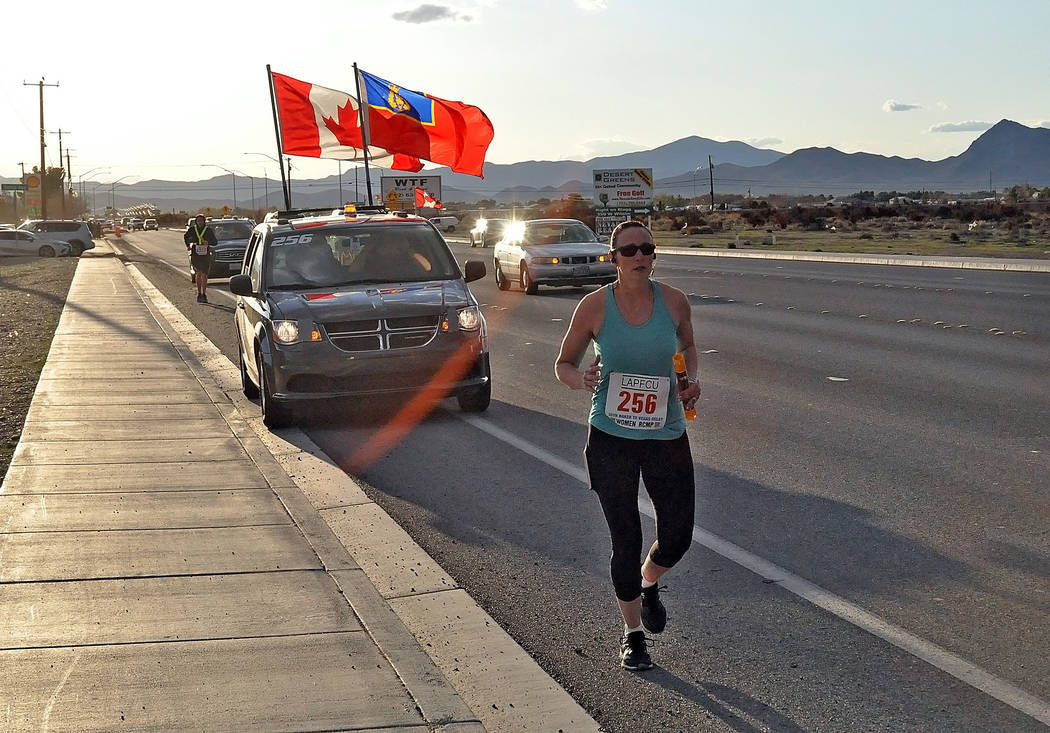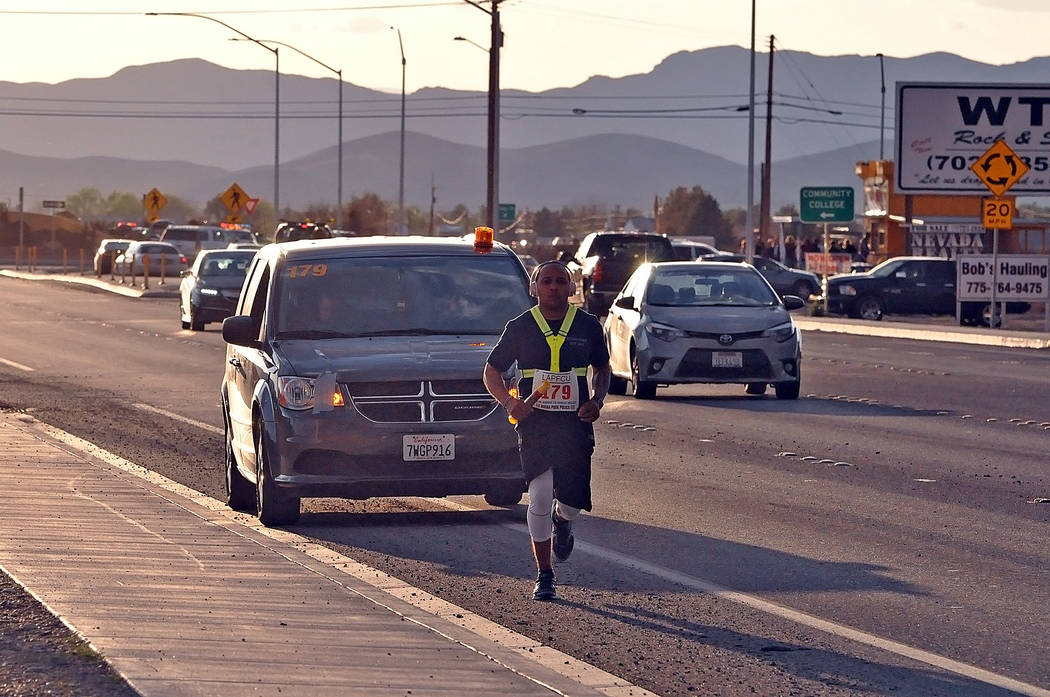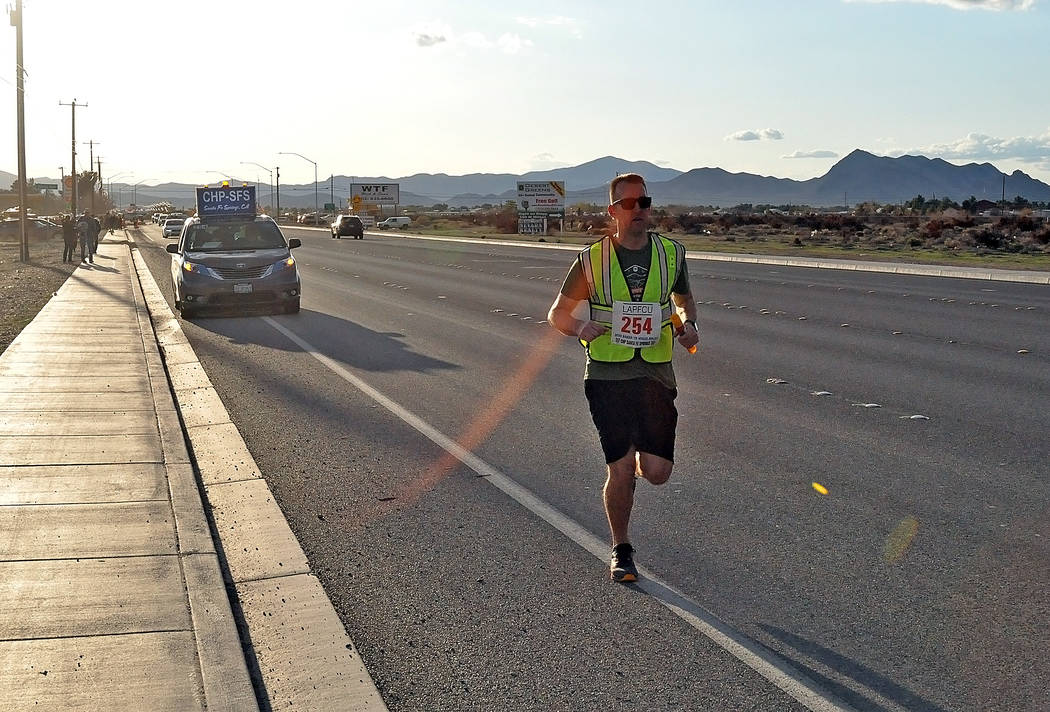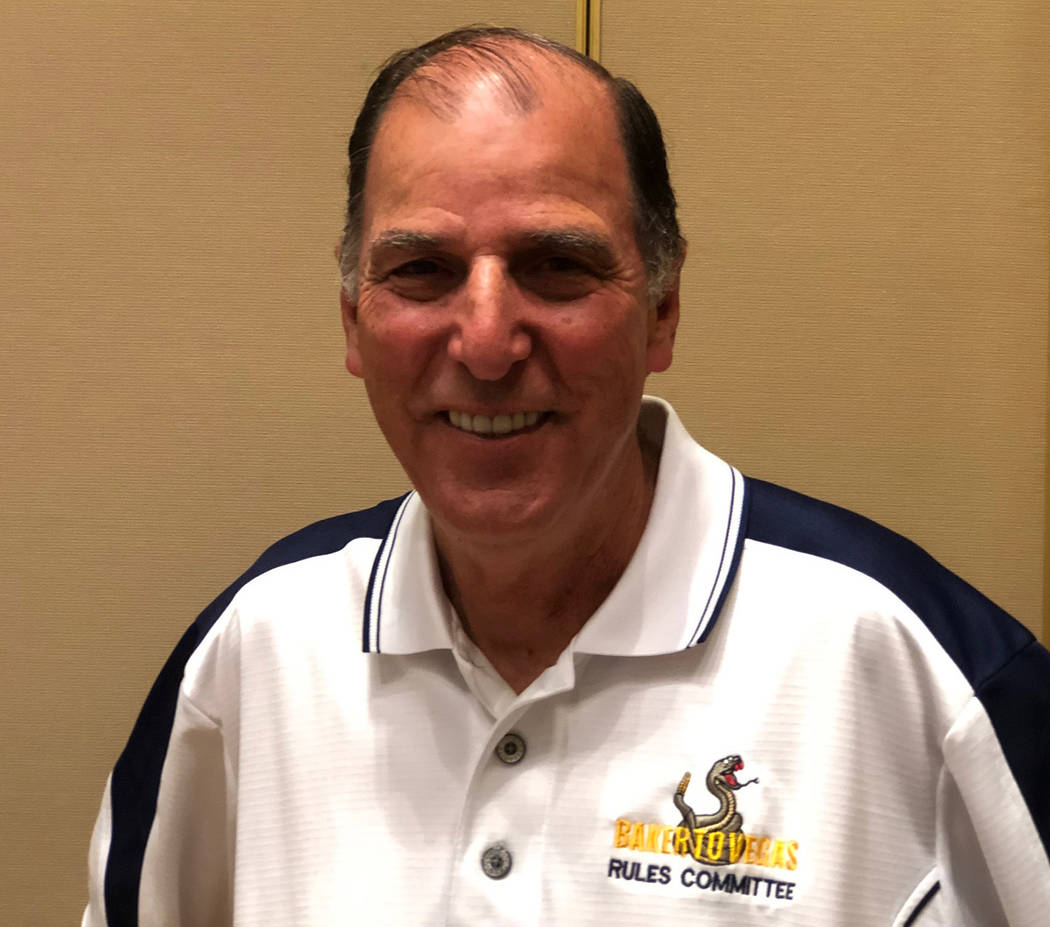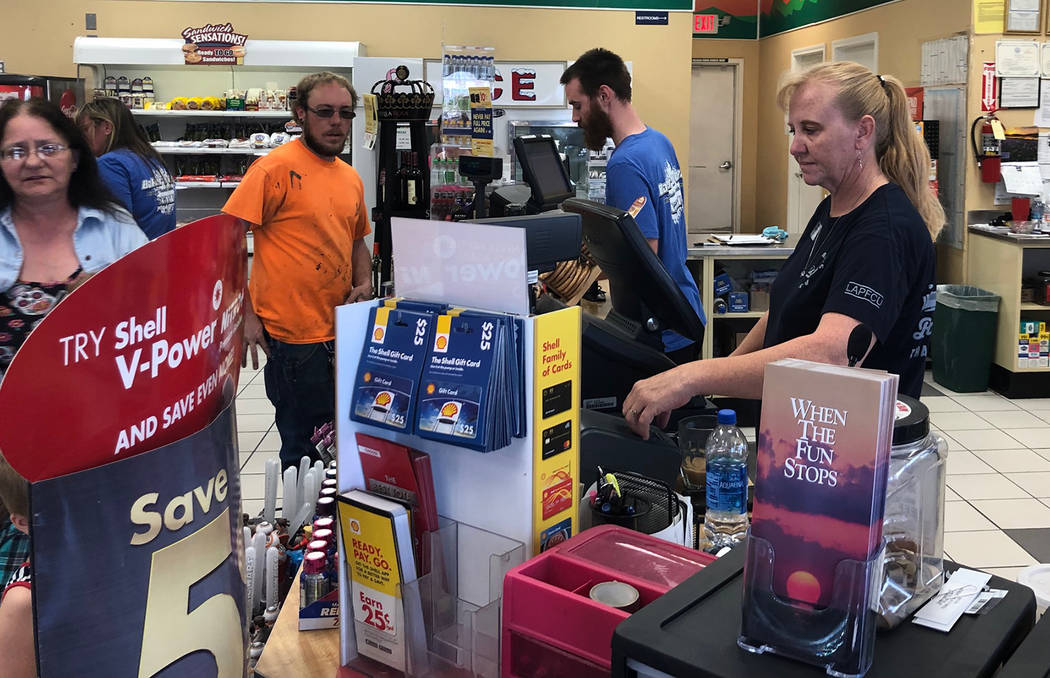Baker to Vegas relay visits Pahrump for 35th year
Chuck Foote’s baby turned 35 this year, and it’s finally old enough to walk on its own. Sort of.
Foote, the co-founder of the Baker to Vegas Challenge Cup Relay, is stepping aside as the day-to-day race coordinator, but don’t expect the person who has coordinated and run in every Challenge Cup Relay, including 22 of them since he retired as an active police officer, to go away now.
“When I say retiring, I don’t mean that I’m moving to the outskirts of the world,” Foote said Sunday at the Westgate Las Vegas Resort & Casino, hours after crossing the finish line as the last runner on his team of retired officers. “I still want to run, and I still want to help out and make sure this thing continues. There’s a lot of things in the race that can easily fall apart if you’re not looking at every little detail.”
Attention to detail is paramount in a race that covers 120 miles through largely empty stretches of California and Nevada, and that was evident from the start, when Foote more or less stumbled upon Pahrump.
“A long, long time ago, December of 1984, Larry Moore, the co-founder with me, and I came out here and looked at the course and discussed the overall framework of what we wanted to do,” Foote said. “I had never heard of Pahrump. We saw this was a means of getting into Vegas. You can’t run down I-15. This is where we discovered Pahrump. At that time it was a two-lane road, pretty much an agricultural kind of town, had nothing to do with Las Vegas. Pahrump is a fun town for us because it’s halfway through the race course. It’s our central location for coordinating half of the race versus the other half of the race.”
A welcoming town
And make no mistake, Pahrump seems to love having the relay pass through town. That’s certainly the case at the Green Valley Grocery at the roundabout on Nevada Highway 372 and Blagg Road, adjacent to Stage 12 of the course, where Jason Roar and Lisa Nielsen volunteer to work on what they say is the store’s busiest day of the year by far.
“I always volunteer to work during this time,” said Nielsen, working her fifth Baker to Vegas shift. “This is my favorite day of the year. And the safest day of the year; they’re all cops. We love it.”
“It’s always really fun, really pleasurable with the customers that come in,” said Roar, who has worked race day the past four years. “I try and volunteer for this weekend every year.”
Both Nielsen and Roar are enthusiastic about a day on which Roar estimates their customer count increases tenfold over a routine day.
“It’s way busier than any other day,” he said about two hours before the first runners were expected to reach the roundabout. “We’re expecting the brunt of it starting at about 6 o’clock. They’re telling us we’ll have teams coming in until about 1 or 2 in the morning.”
Over at the Welcome Wagon in front of the Saddle West, where locals have been offering support to runners for decades, Carol Hansen expected an even longer night.
“We stay here until the last runner,” Hansen said. “That’s about 1, 2 o’clock in the morning, and by the time we close up and get the trailer back to the sheriff’s lot it will be about 3, 3:30.
“We have had a lot of help from Saddle West. They do the electrical, they give us coffee, they give us lights. They’ve been super good to us.”
“The Welcome Wagon was started by a dog groomer in town who did it for five or six years, and then Alice Eychaner took it over, and she did it for 25 years,” Foote said. “She has a son who is a Huntington Beach police officer, so there was something in common there.”
After Eychaner moved to Tennessee two years ago, Jim Cornell of the Moose took over the Welcome Wagon.
“Jim Cornell from the Moose couldn’t do it any more, so we got appointed to it,” Hansen said, referring to the Nye County Sheriff’s Auxiliary. “We got this from the Chamber of Commerce, the trailer, and we went to Albertsons, Walmart and Smiths, and they donated water and bananas. Then three of us did all of the cookies, put them in bags.
“We did about 200 bags of cookies.”
Thousands travel for race
Of course, only a small percentage of the participants passed the Welcome Wagon. There are the runners assigned by their teams to run Stage 12 and the people in the support vehicles that follow the runners, marked with team names and numbers. But many more people are involved in the event, and that put some pressure on the organizers.
“There’s basically no infrastructure in the desert, and when you take close to 10,000 people to a place like that, safety is a key factor,” Foote said. “You have to make sure you have everything safe, and you have to be positive of that. The logistics of it are pretty significant.
“This responsibility has grown as the teams have grown. It’s approaching 300, and I’m pretty sure next year it will be 300. And that magnifies every single facet of it right down to the toilet paper in the port-a-potties.”
A record 284 teams competed in the Challenge Cup Relay this year, and while not all of the runners spent time in Pahrump, enough did to have a major impact on the town.
“It seems to bring a lot of business out here,” Roar said at Green Valley Grocery. “It’s just something that we look forward to every year. We get to see a lot of different people from all over the country.”
“It has hotels, it has gas stations, it has markets,” Foote said of Pahrump. “And we’ve watched the town grow from no McDonald’s to McDonald’s, from no hospital to a hospital, from a two-lane road to a four-lane road. So all of that has made our effort here that much easier and given us an opportunity to expand the race.”
Pahrump was a key partner in the race from the beginning.
“From the first time we ever met anyone there — Floyd in Floyd’s Hardware — they said see him and you’ll get all the details of Pahrump,” Foote recalled. “We did and he thought we were crazy, but he did give us his stamp of approval and we’ve been coming back ever since.
“We said right from the start, ‘We’re going to inconvenience you. We’re going to be coming through here at 2 a.m. and we’re going to make dogs bark and people are going to think someone’s being chased by the police.’”
It didn’t matter. Pahrump put out the welcome mat that first year and has been doing it ever since.
“Next year, April 4 and 5 are the race days,” Foote said. “People here tonight will grab that telephone and say, ‘I want my 10 rooms. We’ve been on the second floor forever.’ And every available room is taken.
“We tell people the race days far in advance not only to warn the people who commute back and forth to Las Vegas, but to tell the businesses, hey if you normally close at 9, you might think about staying open later. We want to make sure that we make a significant impact on the communities we travel through because we do inconvenience people, and we know that.”
And sometimes that impact is more significant over the long haul than Foote ever envisioned as people discover Pahrump during their brief annual visits and decide they like it.
“I’m always scratching my head when someone says, ‘I sold my house in Van Nuys and I’m moving to Pahrump,’” Foote said. “People discover a community that they never knew existed, and we’re very pleased that happens.”
A positive spirit
Conversely, the community discovers that a lot of people from the big cities and even foreign countries aren’t that different.
“We get lots of visitors,” Nielsen at the Green Valley Grocery said. “They come in, use the rest room, buy some things, and everybody is very, very nice.”
The spirit of the event also helps, as participants frequently cite the common bond that law enforcement professionals from all over share.
“Our men and women go out every day to make a difference,” Los Angeles Police Chief Michel Moore said at a chief’s mixer at the Westgate. “They sacrifice so much, and when they see people come out and champion them and recognize their cause, it only encourages them.”
The same sentiment applies within the ranks of the runners.
“Most of the time, you know your fellow runners, but there are teams here where the 20 people are 20 strangers,” Foote said. “Then you get the support staff, and they’re strangers. To have all of that come together is a supreme effort and a testament to their livelihood. This is what they do for a living.
“When they take on challenges, they compete. Twenty strangers attempting to take a barriacded suspect, handle robbery calls, whatever the case may be. They cooperate, and it’s the same thing here.”
That’s the same spirit that draws people from all over to join their fellow officers, prosecutors and others despite the considerable expense and challenge of the relay. Runners from Queensland, Australia, were back this year, and the winning team was from Belize.
“I wouldn’t get on an airplane and fly 14 hours,” Foote said. “That’s a little too claustrophobic for me.”
And they do it for relatively little reward, at least in the tangible sense.
“Half the teams in this race really don’t get anything but a T-shirt,” Foote said. “They’ll spend thousands of dollars, and all they’re going to get is a T-shirt. The other half will get a nice, great big beer mug, and you’ll see them all over this hotel tonight carting around that beer mug. I get people every now and then write me and say, ‘Hey, I broke my beer mug from 1992, do you have a spare?’ And I say have to say sorry, no I don’t.”
Ruben Gonzalez, the race’s director, said the top 50 percent of teams in each category will get the coveted glass mugs.
“They cherish those and winning the outright overall cup is an awesome challenge,” Foote said. “To put 20 people into a run plan that’s perfectly timed out, every single talent that every single one of those 20 people is being used properly, and they run properly and the conditions are proper, add all of that, you’ve got a chance to win. This one was determined by seconds. Not minutes, not hours, by seconds.”
Fifty-one seconds, to be exact.
“I’ve seen it many times, so I know it can happen, and when you look back at it as a team captain, just one person had tied their shoes properly or drunk a little more water or run just a little faster, that’s all it would have taken, one little effort at the end multiplied times 20 people.”
The team that put it all together best this year was the group representing the Belize National Police, which completed the 120-mile course in 12 hours, 49 minutes, 44 seconds, with the last runner arriving at the Westgate at 6:06 Sunday morning. That was 51 seconds better than a team from the Los Angeles Police Department. The slowest team, from Terminal Island, a low-security federal prison in San Pedro, California, needed 22:54:35 to reach the finish line.
But that’s not really the point.
High-profile runners
Like Foote, Moore ran in the race, although Foote ran the closing leg in Las Vegas — fitting that he would end his time as race coordinator by crossing the finish line — while Moore ran his leg in California.
“That’s why I’m walking very gingerly right now,” Foote said. “I’m a little sore. I’ve run in them all.”
After doing all of the work that goes into preparing for the race, running in it as well seems somewhat masochistic, but Foote has a ready response.
“Running is the only peaceful time there is,” he said. “Nobody’s pestering you, nobody’s yanking on you.”
Meanwhile, Moore had a little more time to recover after running his leg.
“I ran Leg 3,” said the LAPD chief, on the job since last June but a 38-year veteran of the force. “I’m being careful with my walking right now. It was only 4 and a half miles. It seemed like 4 million miles, but it was only 4 and a half. No one told me about the uphill part, but it was good.”
Moore has been running in the relay almost as long as Foote has run in it.
“I’ve been doing this race since the mid-80s,” Moore said. “It’s a great opportunity for us to bring law enforcement as a family from across the county, across the world, to come together, share camaraderie, compete, have a great time. We appreciate all of those who put up with the time and inconvenience it takes to run 120 miles through California and Nevada.
“What’s special about this event is not just the runners, but the volunteers and the support staff who are not just cops but people from throughout the country who come together to support this race. Whether it’s a community member, a former member of the LAPD or of law enforcement or just someone who comes out to support this race, we greatly appreciate it.”
That feeling permeates the entire race as well as the after-race festivities and awards ceremony at the Westgate. Although the mood is one of celebration, the bigger picture never is far from view.
“We do a tribute video to officers who have fallen since the last race,” said Gonzalez, the race director. “We’re there for a good cause, and this year the cause is even greater because we’re sendng off Chuck Foote.”
Foote’s departure does not mean everything about the Challenge Cup Relay will be frozen in time. The sponsoring Los Angeles Police Revolver and Athletic Club is trying to add an event in Las Vegas to make a full weekend out of it.
“We’re the athletic club for every LAPD officer, sworn and retired,” Gonzalez said. “We do what’s called a Fight for Life, a boxing event where the LAPD goes against the sheriffs. What we’re hoping to do is kick off B2V weekend next year with our Fight for Life on Friday night, and we would like to donate the proceeds to a local Las Vegas charity. We just don’t have a connection with boxing in the area.”
Should that idea come to fruition, the event founded by Chuck Foote and Larry Moore only will get bigger. But Foote had a feeling their idea would grow into something significant.
“In that very first discussion, in looking at the road, and looking at sort of the back way into Las Vegas in those days, we really thought it could get … we talked about what’s the maximum capacity for the race,” Foote recalled. “Sort of kiddingly, but positively, we thought 300 teams was posisble, and here we are right on the brink of 300 teams 35 years later.”
Guiding the race from its beginnings after the abrupt end of the Death Valley Relay in 1985 to a multinational celebration of law enforcement is quite an accomplishment for one lifetime, and Foote will leave his race coordinator post without actually completely exiting the special world he helped create.
“One of the reasons why I’m stepping down is little things have begun to slip out of my head, and it’s time to put a younger brain to put things in place,” Foote said. “I’ll always answer a call, and I’ll always help where I can, but carrying the ball for the whole cycle of the event is a very taxing proposition, and 35 years of doing that, they got every single bit of me out of me.”


